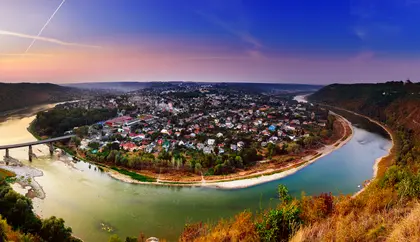“The past is a foreign country” – L. P. Hartley from the 1953 novel The Go-Between.
Mom brought a live rooster from the market, but neither she nor my father had the heart to cut off its head. Stepha, the owner of the cabin we used to rent for the summer, took the matter into her own hands. She grabbed the bird by the paws and carried it to the cage. She filled a bent tin can with water, put it inside the cage, and moved the cage from the shade into the sunlight. “Tomorrow,” said Stepha. “On an empty stomach. ” I was not sure whose empty stomach she meant, but I seemed to enjoy this little ritual before the execution. I pictured the rooster’s chopped-off head with a red scallop in the grass next to a log, and decided to bury it in the garden behind the cabin.
JOIN US ON TELEGRAM
Follow our coverage of the war on the @Kyivpost_official.
At dawn, the rooster woke me up and, for some reason, I woke up in tears. The garden was an apricot garden, and my father used to call it “an apricot paradise.” More than anything else, I liked to smash the apricot pits with cobblestones and take out the kernels. Mom used to say that if you eat a lot of kernels, you can get poisoned, as they contain hydrocyanic acid. The word “hydrocyanic ” made me anxious, and every day I subjected myself to these experiments. Alas, I had no luck in my attempts at poisoning. I also swam right into the middle of the Dniester River and pretended to be drowning. But no-one ever looked in my direction. Ashamed, I returned to the shore and wrapped myself in a big prickly towel.
The name of the town was Zalishchyky, which is in modern day Ternopil Region, Ukraine. It was located right on the border with our region. That summer of 1957 we went there for the last time, but I didn’t know that yet. At the time, I was nine and a half years old. A neighbor, Uncle Kolya, brought us to Stepha. Previously, another uncle used to drive us to Zalishchyky – Uncle Serhiy, an editorial driver who often went on business trips around the region with my father. Uncle Kolya drove up to our house in his Pobeda car and helped to load our belongings into the car: summer things, fishing rods, a chess set, and a fishing net.
We had been driving for an hour and a half. I was enthusiastically inhaling the smell of gasoline, and Uncle Kolya was talking about himself. During the war, he did military service in this region and knew it quite well. My father asked him where he served. Uncle Kolya answered with a shade of boastfulness in his voice: “In the NKVD troops.” And added: “We butchered quite a few of those Bandera-loving bastards here.” My dad pointed at me with his hand, and Uncle Kolya fell silent. This unknown NKVD brought to mind the letters R.V.S. (P.B.C in Russian) from a novel by Arkady Gaidar. I thought of the chieftain from Gaidar’s novel that used to wear a hat adorned with a blue and yellow ribbon.
That summer, my father was going to stay with us for two weeks, and I was looking forward to playing football with him on the beach. However, on the second day, after meeting a colleague from the local newspaper my father said he was leaving. He seemed quite dejected. Finally, he promised that from now on we would go to the sea instead. I was overjoyed. I raved about the sea, devouring adventure novels and picturing myself as a cabin boy or a pirate. My father was telling the truth: the next year we went to Odesa.
I returned to Zalishchyky 65 years later, in the fall of 2022. Not a single path, not a single pebble remembered me. The beach was dead, and the town barely breathed. I went to the local history museum, but the security guard said it was a day off. Wednesday – and a day off? I asked where the bookstore was. The security guard made a gesture towards the church: “It is called Prestige”. I found this Prestige store but it turned out they were only selling stationery. “Is there a bookstore in this city?” I asked. “Yes, the one by the church.” The church was 100 hundred meters away, but the store was closed. There was a sign on the door with Ksenya’s phone number on it. I called. Ksenya didn’t answer. I heard her voice only an hour and a half later when I was already on the road. She asked what kind of books I was looking for. I replied that I was searching for albums about old Zalishchyky, the most fashionable resort in Poland before the war, and for albums about Soviet Zalishchyky. Ksenya said they only had church books.
I returned to Zalishchyky not only because of the albums. In this town, there is a railway bridge across the Dniester River. There are crosses on both banks of the river near the bridge. This is the memory of hundreds of guys and girls from Bukovyna, Lviv Region, Ternopil Region, Stanislav Region (modern day Ivano-Frankivsk Region), burned alive by the NKVD troops in a train of 14 wagons in early July 1941. The Germans were advancing at a speed of 30-40 kilometers per day, and NKVD did not have time to evacuate Ukrainian prisoners further to the east. Before burning them alive, they tied the hands of inmates with wire. The bridge was blown up, and the burning wagons were thrown into the river.
Is the past a foreign country? No. The past is a graveyard
The views expressed in this article are the author’s and not necessarily those of Kyiv Post.
You can also highlight the text and press Ctrl + Enter




